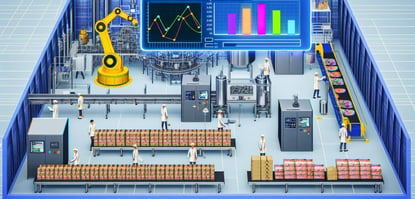AI for Batch Process Optimization
As a Plant Manager, you're constantly seeking ways to optimize batch processes to ensure smooth operations, minimize waste, and meet customer demands effectively. In today's digital age, the integration of artificial intelligence (AI) with batch process optimization offers unprecedented opportunities to streamline operations and drive significant improvements.
This blog explores the transformative potential of AI-enhanced batch process optimization, particularly when integrated with leading enterprise resource planning (ERP), supply chain management (SCM), and manufacturing execution systems (MES) like PlanetTogether and SAP, Oracle, Microsoft, Kinaxis, and Aveva.

AI-Enhanced Batch Process Optimization
Traditional batch process optimization often relied on manual analysis and intuition, which were time-consuming and prone to human error. However, with advancements in AI and machine learning, manufacturers can now leverage sophisticated algorithms to analyze vast amounts of data in real-time, identify patterns, and optimize processes dynamically.
AI-enhanced batch process optimization involves the following key components:
Data Integration: Comprehensive data integration is crucial for AI-driven optimization. This includes gathering data from various sources such as production equipment, sensors, ERP systems, and historical records. By integrating data from disparate sources, manufacturers can gain a holistic view of their operations and identify areas for improvement.
Predictive Analytics: AI algorithms can analyze historical data to predict future outcomes and trends. Predictive analytics help plant managers anticipate potential issues, such as equipment failures or supply chain disruptions, allowing proactive measures to be taken to mitigate risks and minimize downtime.
Real-Time Monitoring: Real-time monitoring enables plant managers to track key performance indicators (KPIs) and process parameters as they occur. By continuously monitoring operations, AI systems can detect deviations from optimal conditions and automatically adjust parameters to maintain efficiency and quality standards.
Optimization Algorithms: AI algorithms use optimization techniques to identify the most efficient production schedules, resource allocations, and batch formulations. These algorithms consider various factors, including production constraints, demand forecasts, and resource availability, to generate optimized plans that maximize throughput while minimizing costs.


Integration with ERP, SCM, and MES Systems
The integration of AI-enhanced batch process optimization with ERP, SCM, and MES systems is critical for seamless operations and data exchange across the entire manufacturing ecosystem. Let's look into how integration with leading systems like PlanetTogether, SAP, Oracle, Microsoft, Kinaxis, and Aveva can enhance efficiency and decision-making:
PlanetTogether Integration: PlanetTogether is a powerful production planning and scheduling software that optimizes manufacturing operations. By integrating PlanetTogether with AI-enhanced batch process optimization, plant managers can align production schedules with demand forecasts, resource capacities, and inventory levels. This integration enables dynamic scheduling adjustments based on real-time data, ensuring optimal resource utilization and on-time delivery.
SAP Integration: SAP offers comprehensive ERP solutions tailored to the food and beverage industry. Integrating AI-enhanced batch process optimization with SAP allows for seamless data exchange between production planning, inventory management, and quality control modules. This integration enables automated decision-making based on real-time insights, improving overall operational efficiency and responsiveness to market demands.
Oracle Integration: Oracle provides end-to-end SCM solutions that streamline supply chain operations. By integrating AI-enhanced batch process optimization with Oracle SCM, plant managers can optimize inventory levels, supplier relationships, and transportation logistics. This integration enhances supply chain visibility and agility, enabling faster response times to changing market conditions and customer requirements.
Microsoft Integration: Microsoft offers a suite of tools, including Dynamics 365, for manufacturing process management. Integrating AI-enhanced batch process optimization with Microsoft solutions facilitates data-driven decision-making and collaboration across departments. This integration empowers plant managers to leverage AI insights to drive continuous improvement initiatives and achieve operational excellence.
Kinaxis Integration: Kinaxis delivers cloud-based SCM and S&OP solutions for agile supply chain management. Integrating AI-enhanced batch process optimization with Kinaxis enables synchronized planning across the entire supply chain, from procurement to production to distribution. This integration enhances supply chain resilience and responsiveness, allowing manufacturers to adapt quickly to market dynamics and customer preferences.
Aveva Integration: Aveva offers MES solutions that optimize manufacturing execution and quality control processes. Integrating AI-enhanced batch process optimization with Aveva MES enables real-time monitoring and optimization of production workflows. This integration improves manufacturing efficiency, reduces waste, and ensures compliance with regulatory requirements.

Benefits of Integration
The integration of AI-enhanced batch process optimization with ERP, SCM, and MES systems offers numerous benefits for food production facilities:
Improved Efficiency: By leveraging AI-driven insights, plant managers can optimize batch processes, reduce cycle times, and increase throughput, leading to higher productivity and cost savings.
Enhanced Quality: Real-time monitoring and optimization enable tighter control over process parameters, resulting in consistently high-quality products that meet customer expectations.
Greater Flexibility: Integrated systems allow for agile response to changing market demands, supply chain disruptions, and production constraints, ensuring adaptive and resilient operations.
Reduced Waste: Optimized batch formulations and production schedules minimize raw material usage, energy consumption, and waste generation, promoting sustainability and environmental stewardship.
Data-Driven Decision-Making: AI algorithms analyze vast amounts of data to provide actionable insights and recommendations, empowering plant managers to make informed decisions that drive business growth and competitiveness.
AI-enhanced batch process optimization represents a game-changing opportunity for food production facilities to achieve operational excellence and competitive advantage. By integrating AI with leading ERP, SCM, and MES systems such as PlanetTogether, SAP, Oracle, Microsoft, Kinaxis, and Aveva, plant managers can unlock new levels of efficiency, quality, and agility across their manufacturing operations.
Embracing AI-driven optimization is not just a technological advancement—it's a strategic imperative for staying ahead in today's fast-paced and dynamic food and beverage industry.
By harnessing the power of AI, plant managers can transform their batch processes into engines of innovation, driving sustainable growth and delivering superior value to customers and stakeholders alike. The future of food production belongs to those who embrace AI-enhanced optimization and continuously strive for excellence in everything they do. Are you ready to take your manufacturing operations to the next level? Contact us today to learn more about how PlanetTogether can help you achieve your goals and drive success in your industry.